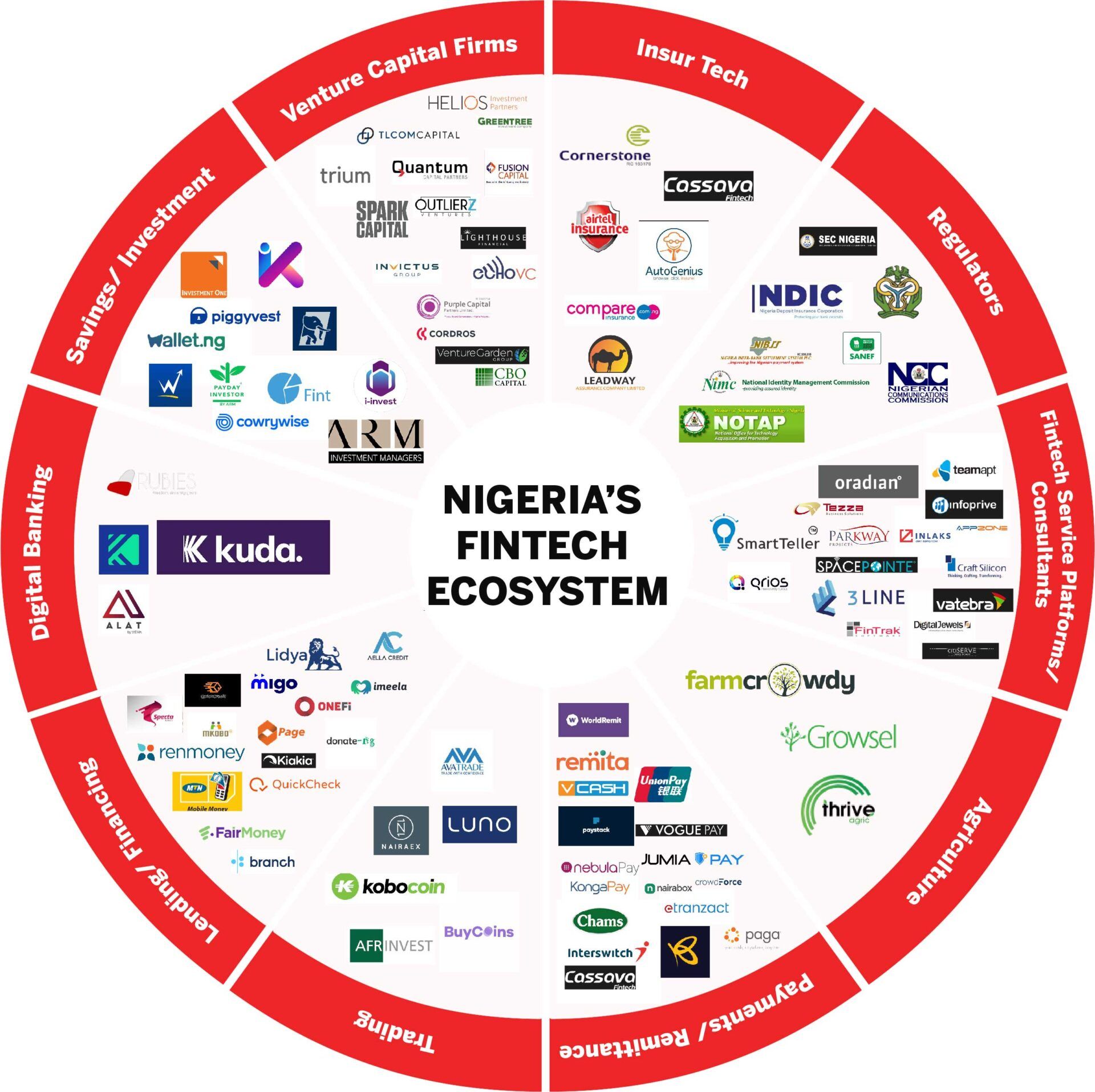WHAT YOU SHOULD KNOW ABOUT THE NIGERIAN FINTECH SECTOR

Fintech is a combination of the words “finance” and “technology. According to Corporate Finance Institute, it describes the evolution of an industry where new technology use cases are developed and deployed to streamline more traditional-looking finance functions. In the Nigerian fintech sector, the payments sub-sector employs the most fintech players, with four moving parts: payment processors, remittance platforms, wallet providers, and merchant services.
Even before the post-pandemic funding boom by the African tech startups which sees the continent raising a record $5 billion in 2021, Nigerian fintech startups have attracted over $2 billion between 2015 and 2022. Fintech startups which account for more than 35% of total tech startups in Nigeria have so far attracted $507 million in funding this year.
The regulatory framework that allowed companies like NIBSS to exist was instrumental in the early evolution of fintech in Nigeria. The Nigeria Inter-Bank Settlement System, which was established in 1993 and is owned by all licensed banks, including the Central Bank of Nigeria, is an important player in the Nigerian payment landscape. NIP (NIBSS Instant Payment), an online real-time Inter-bank payment solution, and NAPS (NIBSS Automated Payment Services) have also enabled financial transactions to take place in both P2P and P2B settings.
NIBSS, on the other hand, cannot be considered a true fintech company. It is more of a regulated entity owned by banks, and while a plethora of Fintech companies comprise this era, the most popular were Interswitch, SystemSpecs (Remita), UPSL, and eTranzact.
PIONEER FINTECH COMPANIES IN NIGERIA

Interswitch was founded in 2002 to address a real issue: the lack of adequate infrastructure to support digital payments, particularly card payments. Debit card transactions were possibly non-existent in Nigeria before Interswitch; in fact, a debit card from any bank in the world was practically useless in Nigeria before Interswitch. Interswitch was one of the first card switches to power nationwide ATM transactions, which was game-changing for the finance ecosystem at the time. Interswitch also enabled merchants to accept digital payments from their customers online through a payments gateway.
SystemSpecs (Remita) is a pioneering Nigerian fintech responsible for a slew of innovative payment solutions, most notably its role as the primary payment gateway powering the Federal Government TSA initiative, which saves the Nigerian government $1.2 billion annually. According to Central Bank of Nigeria data made public in 2019, Remita processed over $ 46 billion in transactions in 2019. It also has critical infrastructure across all major Nigerian banks, enabling it to perform direct account-to-account payment authorizations in Nigeria.
Unified Payment Services Limited (UPSL), founded in 1997 by a consortium of leading Nigerian banks, UPSL, like Remita has infrastructure across major Nigerian banks that allows it to perform some level of debit and credit transactions.
UPSL is also one of the major switches that supply power to the vast majority of POS terminals in Nigeria. According to NIBSS data, POS terminals in Nigeria processed more than $15.5 billion in transactions. UPSL is also responsible for a couple of innovative solutions in the Nigerian fintech space, such as pioneering the issuance of globally accepted Naira cards.
Etranzact, which was founded in 2003, is another key Fintech player. Etranzact is a leading TPP (Third Party Processor) for MasterCard in Africa, providing Transaction Switching and Payment Processing services.
NIGERIAN FINTECH DEMOCRATIZERS

While the pioneering fintech companies laid the foundation and pursue a singular goal of providing payment infrastructure in Nigeria, it took another generation of fintech companies to extend access to financial services to people who were before then not captured by the traditional banking system. Some of these players are Paystack and Flutterwave.
Fintech payment companies made payment solutions available to those who were previously excluded. The pioneers were content to serve primarily larger players, which made sense given that payments are primarily a scale business, with 1.5% being the standard MSC (Merchant Service Charge) price for collections in Nigeria.
These players decided to aggressively pursue these smaller markets (while not completely ignoring the bigger ones). Paystack and Flutterwave are aimed at SMEs and the like, allowing them to integrate a payment gateway on their digital touchpoints and receive payments digitally.
This started a chain reaction that brought a slew of merchants online and made e-commerce a viable option in Nigeria. Unlike the pioneers who had a monopolistic hold on the market, which may have resulted in a lack of innovation or drive on their part, the succeeding players played a significant role in breaking that monopoly and reviving the industry.
This evolution has led to the emergence of digital banks that are now at the forefront of driving financial inclusion for the largely unbanked and underbanked Nigerians.
The Nigerian payments and, by extension, the fintech landscape has evolved significantly over the years, and with a large number of people still unbanked and a good number of transactions still taking place in cash, the potential for digitization, value creation, and value extraction for companies with the ability to execute at scale remains strong.
NIGERIAN FINTECH SECTOR IN 2022

Fintech is still the most active sector in Nigeria, both in terms of transactions and funding amounts. This year alone, fintech startups (excluding fintech adjacencies and enablers) have raised more than 60% of the total funding amount raised by Nigerian startups. These accomplishments have had a massive market impact.
Fintech startups are by far the most common in the Nigerian startup ecosystem, as they are in the majority of the continent’s established ecosystems. It accounts for over 35% of the total number of tech startups in the country, a figure that is three times larger than the next most populated space, e-commerce, and retail tech.
FACTS AND FIGURES ABOUT THE NIGERIAN FINANCIAL TECH STARTUPS
VERTICALS
Payments and remittances currently have about 46 startups, accounting for approximately 26.6 percent of Nigerian fintech ventures, and lending and financing has 34 startups, representing 19.7 percent of Nigerian fintech startups. There is also a lot of activity in the blockchain, investment technology, personal finance, and business administration sectors. Given the opportunity presented by African consumers’ inability to access traditional credit-based services, the lending and financing space is consistently and increasingly popular among startups. Nigeria has relatively high activity in areas such as blockchain, investment technology, and open banking when compared to its peers on the continent, but remains underserved in insurtech.
NUMBER OF EMPLOYEES
Nigerian fintech sector is by far the largest employer in the country’s broader startup ecosystem, accounting for 8,653 jobs, with an average of 50 jobs per startup. RenMoney (892), Cowrywise (570), Flutterwave (541), TeamApt (460), FairMoney (385), and Kuda are six of the top ten employers in the Nigerian startup ecosystem (356).
FOUNDERS DIVERSITY
In terms of the diversity of the founders by gender, the sector performs poorly. So far, about 24 fintech startups have at least one female co-founder, representing an average of 13.9%, which is lower than the national average of 15.6%.
Many believe that the Nigerian fintech sector is over-saturated, this is rather far from the truth, as the country still housed over 60 percent unbanked and underbanked persons according to McKinsey reports. Also, less than 10 percent of financial transactions in 2021 were done electronically, which implies that over 90 percent of financial transactions in the country were carried out with cash. Despite the progress recorded in funding, transaction volume, revenues, and several fintech startups in the ecosystem there is still room for more improvement, especially in the area of onboarding the unbanked rural population in the country.
